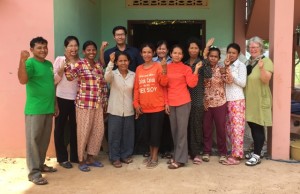EASY
Title: Empowering Agricultural Cooperatives and Civil Society Development in Siem Reap, Cambodia
Period: 1. June 2017 – 31. May 2020
Cooperation Partner: READA
Project coordinator: Kjeld Vodder Nielsen; Projekt Manager in Cambodia Chea Phalla.
Country Leader: Bodil E. Pallesen, ADDA
Summary: Poverty affects the people of the rural areas of Siem Reap. The goal is to improve living standards in rural areas; increase income and improve social conditions for the vulnerable and poor – especially women. The development of stronger civil society organizations is catalyzed. 12 cooperative associations will be strengthened and a Cambodian Agricultural Union will be established. The associations serve members with low-cost credit, cheaper fertilizers/aids, and/or sell productions at better prices. The democratic, organizational and business capacity of cooperatives is strengthened. They will influence public investment in the community and represent members of the high-level political dialogue with the intention of improving the framework conditions for agriculture and healthy civil society development. Existing self-help groups were the original starting point for cooperative associations, but the interest of “external” farmers is high. 5,000 members are expected by 2020.
Overall objective:
Poor people in the rural areas of Siem Reap have achieved improved living conditions because strong civil society organizations have developed in their communities.
Immediate goals:
By 2020, a joint association for local agricultural cooperatives in Siem Reap (Cambodian Agricultural Cooperative Union – CACU) has built up democratic and organizational capacity to effectively support 10 Agricultural Cooperatives (ACs), representing at least 3,000 members.
- By 2020, 10 out of 12 Agricultural Cooperatives have improved the ability to operate profitable cooperatives and adequately service members with excipients, credit lines, professional training, etc.
- By 2020, 155 Self-Help Groups (SHGs), 12 ACs, CACU and ADDA’s local partner – READA – are aware of significant agricultural and rural policy issues, and affect local and national decision-making on rural development.
Indicators:
By 2020, a joint association for local Agricultural Cooperatives (CACU) will be established and registered in Siem Reap Province.
- The Joint Association of Local Agricultural Cooperatives will get membership of at least 10 Agricultural Cooperatives (ACs) and the Democratic Union operates in a democratic manner.
- The joint association provides training and service that meets the needs (80%) of the member cooperatives.
- By 2020, 10 agricultural cooperatives have improved member service in relation to the members’ initial base assessment (2017) of services.
- By 2020, 70% of members of the self-help groups have been enrolled in an Agricultural Cooperative.
- By 2020, 60% of the members of the Agricultural Cooperatives will satisfy the services provided by the cooperatives.
- The local partner READA, the Cooperative Association (CACU), the Agricultural Cooperatives and the Self-Help Groups engage in advocacy, which improves income and the rights of the poor at both national, provincial, district, municipal and village level.
- 1,000 priority improvements among the poor in rural areas are integrated into the Community Investment Planning and 50% of the proposals are addressed.
- 5 proposals/priorities are treated by “duty-bearer” (provincial and/or national).
Results:
By the end of 2018, a joint association for Agricultural Cooperatives in Siem Reap operates in accordance with guidelines and best practices for joint associations in Cambodia.
- By 2020, the joint association is able to analyze the context of Agricultural Cooperatives and monitor and develop local cooperative ssociations, such as best practice for the operation and further development of viable cooperatives.
- By 2020, the joint association has become an effective service provider for local Agricultural Cooperatives.
- Local Agricultural Cooperatives have effective internal management, as well as effective structures, procedures and protocols, and they have a broad and democratic membership base.
- Local Agricultural Cooperatives operate viable commercial activities that improve self-perception and members’ income.
- Local Agricultural Cooperatives provide appropriate services that support the Self-Help Groups and their members.
- The boards of the joint association and local cooperatives have strengthened their knowledge of agricultural and rural development policies as well as management. This knowledge is used in their direct dialogue with relevant authorities to meet farmers’ needs.
- By the end of 2020, 125 out of 155 SHGs and 10 ACs work effectively for/participate in political dialogues at local level (village, municipal and/or district level).
- By the end of 2020, CACU and READA participate in political dialogues at provincial and national level.
Target group:
The project’s target group (Right-holders) is primarily poor rural residents – especially women. The target group consists of existing – as well as new – members of 12 Agricultural Cooperatives and 155 Self-Help Groups.

